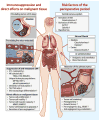A new approach to reducing postsurgical cancer recurrence: perioperative targeting of catecholamines and prostaglandins
- PMID: 22753587
- PMCID: PMC3445778
- DOI: 10.1158/1078-0432.CCR-12-1087
A new approach to reducing postsurgical cancer recurrence: perioperative targeting of catecholamines and prostaglandins
Abstract
Surgery is a crucial intervention in most cancer patients, but the perioperative period is characterized by increased risks for future outbreak of preexisting micrometastases and the initiation of new metastases-the major cause of cancer-related death. Here we argue that the short perioperative period is disproportionately critical in determining long-term recurrence rates, discuss the various underlying risk factors that act synergistically during this period, and assert that this time frame presents an unexplored opportunity to reduce long-term cancer recurrence. We then address physiologic mechanisms that underlie these risk factors, focusing on excess perioperative release of catecholamines and prostaglandins, which were recently shown to be prominent in facilitating cancer recurrence through their direct impact on the malignant tissue and its microenvironment, and through suppressing antimetastatic immunity. The involvement of the immune system is further discussed in light of accumulating evidence in cancer patients, and given the recent identification of endogenously activated unique leukocyte populations which, if not suppressed, can destroy autologous "immune-resistant" tumor cells. We then review animal studies and human correlative findings, suggesting the efficacy of blocking catecholamines and/or prostaglandins perioperatively, limiting metastasis and increasing survival rates. Finally, we propose a specific perioperative pharmacologic intervention in cancer patients, based on simultaneous β-adrenergic blockade and COX-2 inhibition, and discuss specific considerations for its application in clinical trials, including our approved protocol. In sum, we herein present the rationale for a new approach to reduce long-term cancer recurrence by using a relatively safe, brief, and inexpensive intervention during the perioperative period.
©2012 AACR.
Conflict of interest statement
The authors declare no conflict of interest
Figures

References
-
- O’Reilly MS, Boehm T, Shing Y, Fukai N, Vasios G, Lane WS, et al. Endostatin: an endogenous inhibitor of angiogenesis and tumor growth. Cell. 1997;88:277–85. - PubMed
-
- Bernabe DG, Tamae AC, Biasoli ER, Oliveira SH. Stress hormones increase cell proliferation and regulates interleukin-6 secretion in human oral squamous cell carcinoma cells. Brain Behav Immun. 2011;25:574–83. - PubMed
Publication types
MeSH terms
Substances
Grants and funding
LinkOut - more resources
Full Text Sources
Other Literature Sources
Research Materials

